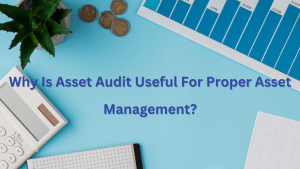
If you own a business, you must own some assets. You probably already knew this. But asset management is something most businesses miss out on. Because most people have the wrong impression about asset management. Asset Management does not only consist of repairing the machines when they start malfunctioning. It includes a lot of other things as well, such as regularly sending them for servicing, keeping track of all the information about those assets, knowing the history of the assets, knowing when the business would need to buy new assets etc. That is what proper asset management is all about. Because asset management is not just about the assets, it’s about the business as well. We need to know what the business needs and how these assets will serve the business best.
Hence, from time to time, it is important that businesses perform Asset Audit. Let’s first understand what Asset Audit is.
Asset audit is a process of verifying, validating, and accounting for all assets owned by an organization. The objective of an asset audit is to ensure that all assets are accounted for, their locations are correctly recorded, their condition is accurately assessed, and their value is appropriately recognized in the financial statements. Asset audits are an essential part of asset management because they provide accurate information on the state of the assets, their usage, and their maintenance needs. According to the details provided by Nural, an Asset Audit helps businesses ensure that everything is in order. In this article, we will discuss why asset audit is useful for proper asset management.
Helps to maintain an accurate asset inventory:
Asset audit is an essential tool for maintaining an accurate inventory of all assets owned by an organization. It provides an accurate picture of the assets available, their location, and their current condition. With an accurate asset inventory, organizations can track their assets, prevent theft or loss, and make informed decisions about their maintenance and replacement.
Helps to reduce asset losses:
Asset audit helps organizations to reduce asset losses. By conducting regular audits, organizations can identify assets that are missing or have been stolen, and take appropriate actions to recover or replace them. Asset audit also helps to detect assets that have been underutilized or abandoned, and reassign them to more productive use
Helps to identify maintenance needs:
Asset audit helps organizations to identify assets that require maintenance or repair. By assessing the condition of the assets during the audit process, organizations can identify assets that need immediate attention and schedule maintenance or repair work to prevent further deterioration. This proactive approach to maintenance helps to reduce downtime, repair costs, and prolong the life of the assets.
Helps to comply with regulations:
Asset audit helps organizations to comply with regulatory requirements related to asset management. For example, organizations may be required to maintain accurate records of their assets for tax or insurance purposes. By conducting regular asset audits, organizations can ensure that they have the necessary records and documentation to comply with these regulations.
Helps to make informed decisions:
Asset audit provides organizations with accurate and up-to-date information on their assets. This information can be used to make informed decisions about the maintenance, repair, replacement, or disposal of assets. By making data-driven decisions, organizations can optimize their asset management practices, reduce costs, and improve operational efficiency.
In conclusion, asset audit is a crucial process for proper asset management. It helps organizations to maintain an accurate asset inventory, reduce asset losses, identify maintenance needs, comply with regulations, and make informed decisions. By conducting regular asset audits, organizations can ensure that their assets are well-managed, and their value is appropriately recognized in the financial statements.


